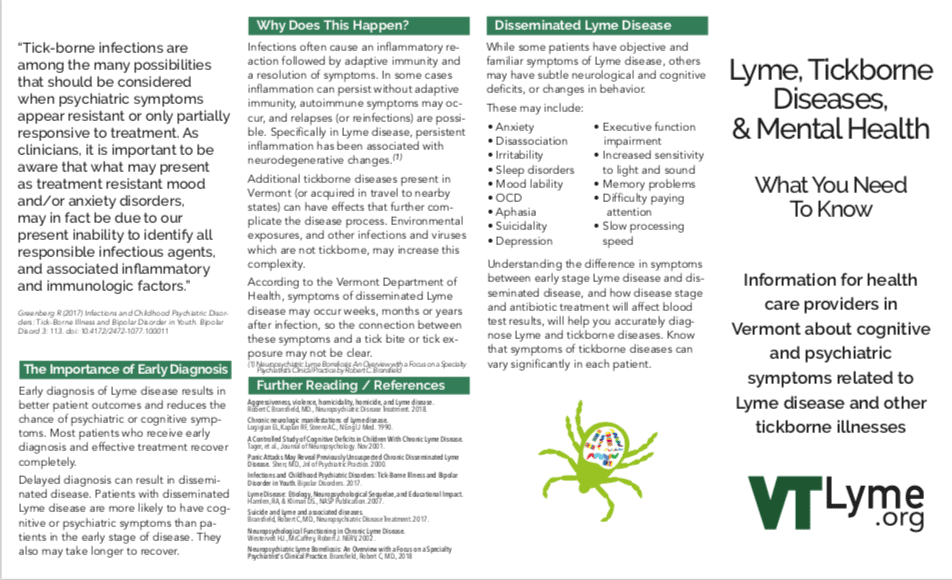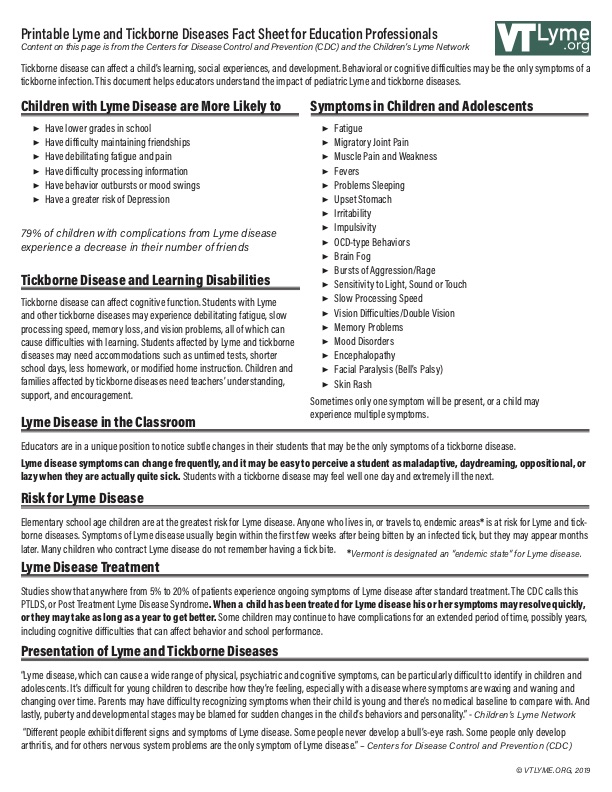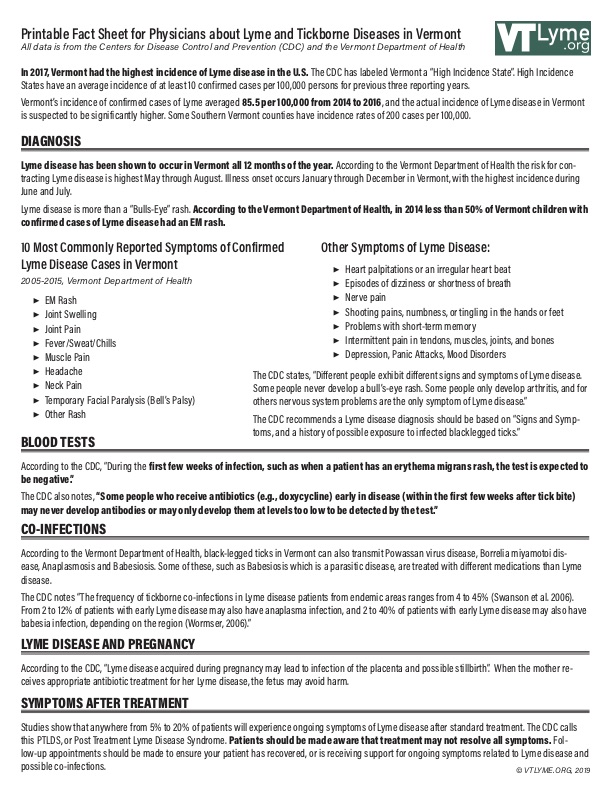
The information below can help you better understand the unique challenges and difficulties for people who are living with Lyme disease and tickborne illnesses.
1. Symptoms can change frequently. Because some symptoms are related to inflammation, they can vary from day to day. Someone with PTLD may feel up for hiking or playing sports one day, and be genuinely bedridden the next. Not being able to predict how you will feel, or knowing what you will be able to accomplish each day, can be incredibly frustrating.
What you can do: Be flexible and compassionate. Don’t accuse someone of ‘faking it’, or say, “they didn’t seem sick yesterday”. Try to understand when plans must be altered to accommodate changing symptoms.
2. Some people with PTLD have to watch what foods they eat. Some do not eat sugar, others find a gluten and dairy free diet important to their health. Their bodies may have difficulty processing alcohol or caffeine, and certain foods or beverages can affect their immune system. This makes dining at restaurants, or celebrating special occasions, difficult – especially for children.
What you can do: Avoid making fun of someone who needs to make food choices that are atypical for our culture. Even better – provide gluten free, dairy free, low sugar (or sugar free) alternatives for your guest. Choose restaurants that can accommodate their dietary needs.
3. They have to rest. ‘Overdoing it’ can have a negative impact on someone with a tickborne illness. For parents with young children, and people who had vital, vibrant lives before becoming sick, slowing down and doing less can be emotionally challenging. In addition, insomnia can affect people with complex Lyme disease so they may not be getting enough rest at night (a problem when proper sleep is essential for a healthy immune system).
What you can do: Be patient. Be flexible. Cook them a meal, mow their lawn, babysit their children, drive them to a doctor appointment, help them any way you can. Recognize that people who used to be able to ‘do it all’ will not be able to – until they take time to heal. For children, remember that what looks like ‘behavior problems’ or ‘tantrums’ may be their only way of letting you know they need more support.
4. Supplements, herbal medicine, acupuncture, naturopathy, and complimentary medical interventions have helped some people with tickborne illnesses. Bacteria can deplete essential minerals, and a body may benefit from detoxification and herbal support. Probiotics help repopulate the ‘good bacteria’ often destroyed by antibiotics used to treat tickborne diseases. While complimentary medicine and other interventions may not be ‘mainstream’ they have been shown to help people with a tickborne illness heal.
What you can do: Protect your loved ones from people who claim they can ‘quickly cure’ complex illnesses, and who offer expensive treatments (people sick with Lyme or tickborne diseases are often desperate to feel better!) Respect that complementary medicine, professional advice, diet choices, and activities such as yoga, massage, and meditation have been shown to promote healing and well-being. Use this printable fact sheet to help inform their physicians about Lyme disease.
5. Depression, Rage, and Cognitive Difficulties can all be symptoms of a tickborne illness. According to Sandy Berenbaum, LCSW, “Children and adolescents with chronic Lyme often meet the DSM criteria for one or more “mental illnesses”–anxiety disorder, depression, anorexia nervosa, AD/HD, as well as disorders in which behavioral problems manifest”. A survey by the National Lyme Disease Association revealed 59% of people diagnosed with Lyme disease were initially diagnosed with a mood disorder. Depression, memory loss, changes in behavior, and cognitive problems may be the only noticeable symptoms of an active infection.
What you can do: Recognize the psychological and cognitive symptoms of tickborne diseases. Notice when someone’s behavior is unusual or atypical and inquire, rather than judge. Help others learn how tickborne diseases in children may appear as ADHD, learning disabilities, or behavior problems.
6. People with PTLD can be very uncomfortable in the heat. They may feel more sick in hot weather. If they are taking antibiotics, they may need to avoid sun exposure entirely. People with neurological disease may have heightened sensitivity to bright light.
What you can do: Plan activities for cooler times of day (or stay indoors with air conditioning). Be respectful when someone says they are uncomfortable, and make sure that cool, shady areas are accessible.
7. It may take a long time to heal from PTLD and other tickborne infections. In a culture used to “quick-fixes” it can be hard to comprehend that healing from a complex tickborne disease may take weeks, months, or even years. Some people find treatment works quickly and effectively. Others may go into remission, but may have a lifetime of dietary restrictions, vulnerable immune systems, and fears of relapse.
What you can do: Be supportive. Let your loved ones know that you are with them for the ‘long haul’. Remember that, although PTLD is a medical diagnosis, the psychological and emotional impact of a complex illness is vast, especially when someone’s lifestyle and productivity is radically altered.
8. A tickborne disease can be expensive. Health care costs for people with PTLD are significantly higher than the general population, and some effective treatments may not be covered by insurance. This can increase stress (especially for someone who is too sick to work!) and reduce opportunities to participate in social activities – at a time when social support and interaction is critical to emotional health and well-being. A family’s resources may be skewed toward a sick child, leaving others’ needs unmet.
What you can do: Plan social activities that are low cost, such as watching a DVD, attending a free lecture, or sharing a picnic. If the financial impact of a tickborne disease on a family is significant, help organize a fundraiser. Assisting with yard work, tax preparation, simple car repairs and similar tasks can help reduce a family’s overall expenses.
9. People with a complex tickborne disease (and their families) can become isolated. Friendships can wither during a long convalescence, plans may frequently need to be cancelled – and for children, behavior changes can affect the development of social skills (which is then exacerbated by the resulting lack of healthy interactions). People living with PTLD and their families can often feel very alone.
What you can do: Check in – often. Be understanding when someone feels overwhelmed, or has to change plans at the last minute. Be a good listener. Invite a child to a playdate or birthday party – even if their behavior can be challenging (arrange for an extra helper to assist the child). Most of all act with compassion for the person with a complex tickborne disease, and their family.
10. It is hard to find proper treatment for PTLD and tickborne illnesses. People often have to travel many hours, or even out of state, to find effective treatments.
What you can do: Offer to check on pets, or pick up children from school. Make a ‘care package’ for long car trips. Gift hotel vouchers or airline miles. Join others who support expanding training for medical professionals about the diagnosis and treatment of tickborne illness.



